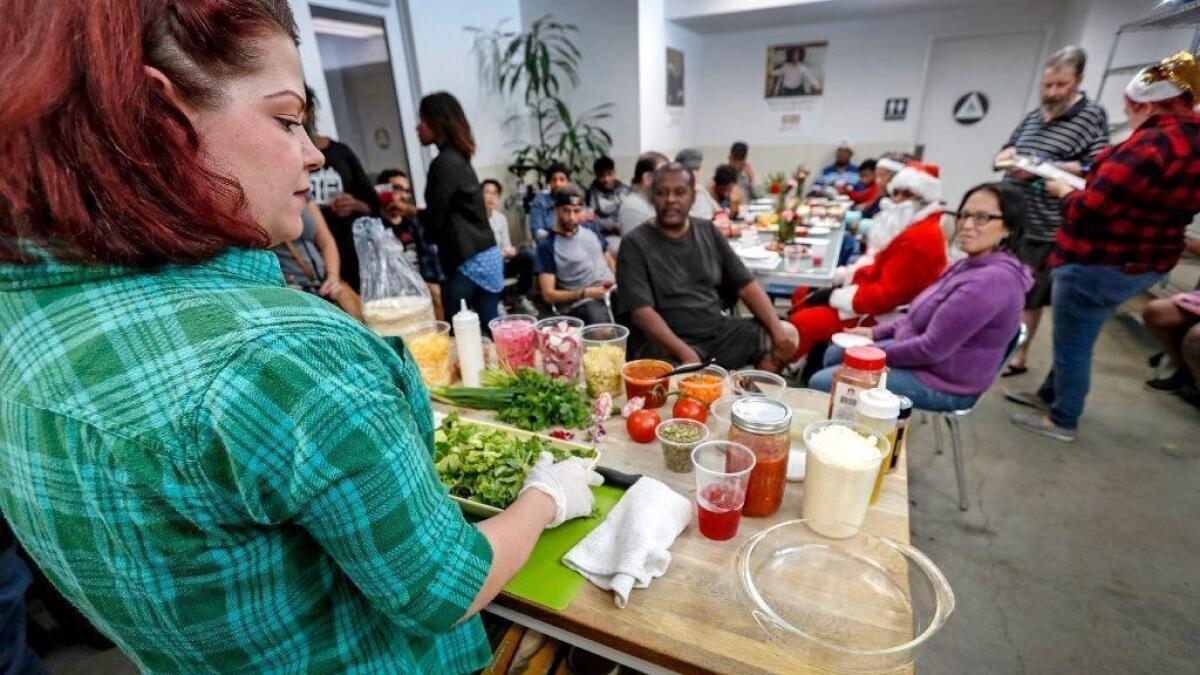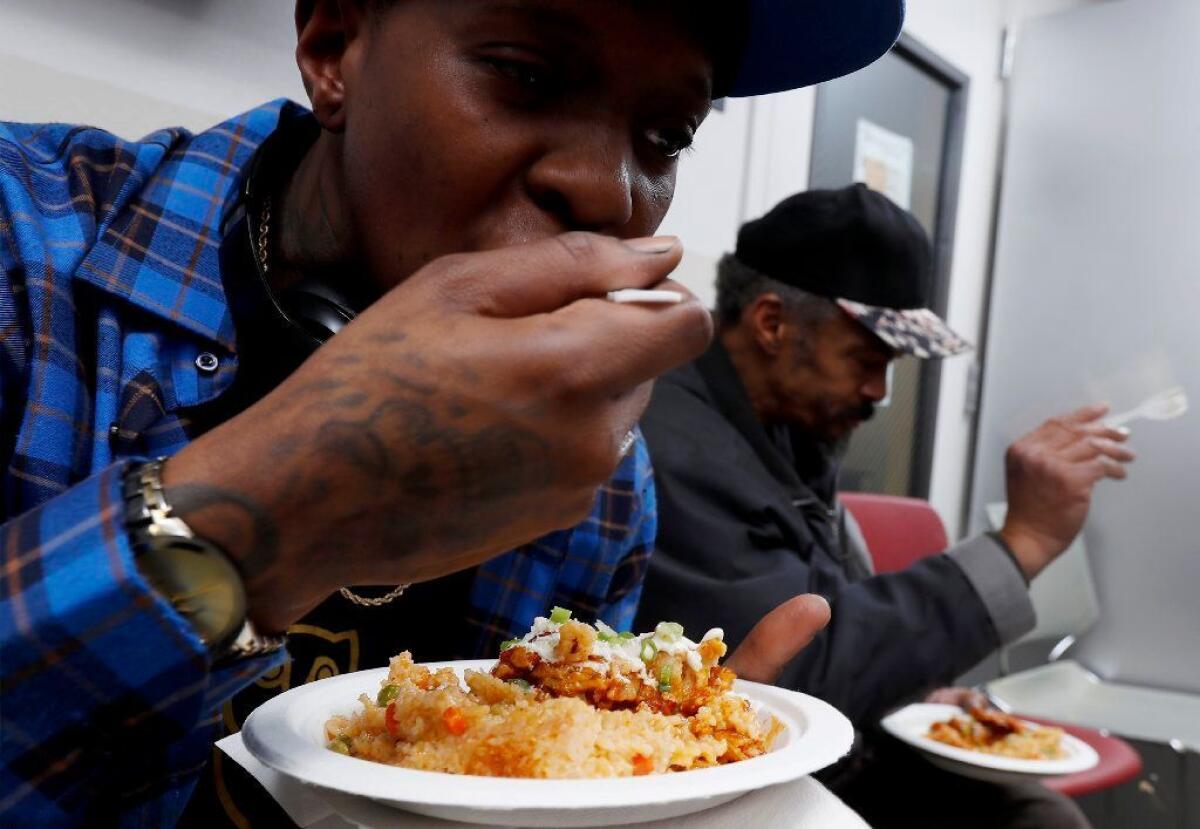In a skid row apartment building, L.A. restaurant chefs help residents get cooking

- Share via
On a cool December evening, a group of residents at the Charles Cobb Apartments in downtown made their way through the building’s open-air courtyard to the communal kitchen for a cooking class.
There, a pot of sauce was simmering on the stove, and Saint Nick himself — or someone dressed up as him, anyway — was seated at the large dining table, noshing on crudité and salsa and drinking a cup of hibiscus agua fresca spiked with cinnamon. Once the room filled, chefs Sara Kenas and Eric Seoane of Anarchy Seafood began the evening’s class, which featured a menu of salad, Spanish rice and an enchilada casserole.
For the uninitiated, the Cobb isn’t a luxury condo offering cooking classes as an amenity to fill expensive apartments, but a 76-unit permanent supportive apartment building on Skid Row developed and managed by the Skid Row Housing Trust.
Founded in 1989, the Trust is a pioneer of the “housing first” model, which offers permanent, unconditional housing for homeless individuals, along with healthcare and other on-site services. The Trust has 26 permanent supportive housing buildings in Los Angeles County, with three more in development. (To say these buildings are urgently needed would be an understatement: At last count, there are just under 32,000 homeless individuals in the city of Los Angeles, and a little more than 53,000 countywide.)
Kenas has been teaching monthly classes at the Cobb since July (other chefs, like Sarintip “Jazz” Singsanong from Jitlada and Taylor Persh, formerly of Westbound, have participated too). The classes teach residents how to cook in the service of a larger goal: to help alleviate their food insecurity. Healthful food is a “real tool to keep people stable, keep people housed, help people thrive and to be able to reintegrate into the community,” said Jack Lahey, director of resident programs and part of the trust’s food insecurity task force.
“The classes started out as interest to get the residents more comfortable with cooking and familiar with healthy habits,” he said. “We just want to make sure that at the end of the day, they’re able to cook and prepare food.”
The trust has several programs to bring fresh, healthful foods to its residents, including food pantries, rooftop gardens and a partnership with Food Forward, a group that collects unsold produce from farmers markets and gets it into the kitchens of those in need. Chef-led cooking classes, offered at the Cobb and two other buildings, are a newer initiative, one that adds an educational component.
The classes could also function as a bridge of sorts: Bringing in chefs from the neighborhood — the Cobb is located a few blocks from the Historic Core and Little Tokyo — to teach classes could go a ways toward integrating the building and its residents with the larger downtown food scene, and vice versa. That’s the hope, anyway; the program is still in its infancy, and the trust will be assessing the effect of its efforts over the next few months.
During the class, Kenas and Seoane demonstrated how to make a salad of lettuce, tomatoes, pickled red onions, pepitas and cotija; Spanish rice perfumed with bay leaves; and an enchilada casserole layered with chicken, cheese and sauce.
Throughout the demonstration, they fielded questions (“What’s the deal with bay leaves?”) and, as with all good cooking classes, peppered the lesson with spontaneous wisdom: how important it is to taste while cooking, that chicken thighs offer cost and flavor benefits over other cuts, that there are easy ways to substitute vegetables in a recipe that calls for meat.
As the last casserole square was served, residents lingered, taking selfies with Santa, swapping ideas for casserole fillings. One resident, Emily, gave the class top marks: “I like chef Sara’s attitude, her positivity, everything.” (To protect their privacy, residents here are identified only by their first names.)
“All of her meals have been good,” added Elizabeth, who has lived at the Cobb for three years. She’s a regular student at Kenas’ classes, so much so that when she spotted a flyer for the evening’s lesson posted in the elevator, she said she cleared her calendar. “I was like, ‘Oh I gotta come!’”

Kenas, who splits her time among Smorgasburg, pop-ups at South Bay breweries and other gigs to volunteer at the Cobb, has taught six classes so far. Her suppliers and local farmers often donate ingredients for her classes, and she’s mindful to plan menus around residents’ needs and budgets.
“I try to make dishes as universal as possible, giving different options for ingredients and cooking equipment,” she said.
And residents aren’t the only ones who benefit from these classes.
“It’s nice to give back and help people,” Kenas said. “But I also do it for me. The [food] industry can be super-stressful and overwhelming. Then I walk out of here and I just feel like I can breathe.”
More to Read
Eat your way across L.A.
Get our weekly Tasting Notes newsletter for reviews, news and more.
You may occasionally receive promotional content from the Los Angeles Times.










